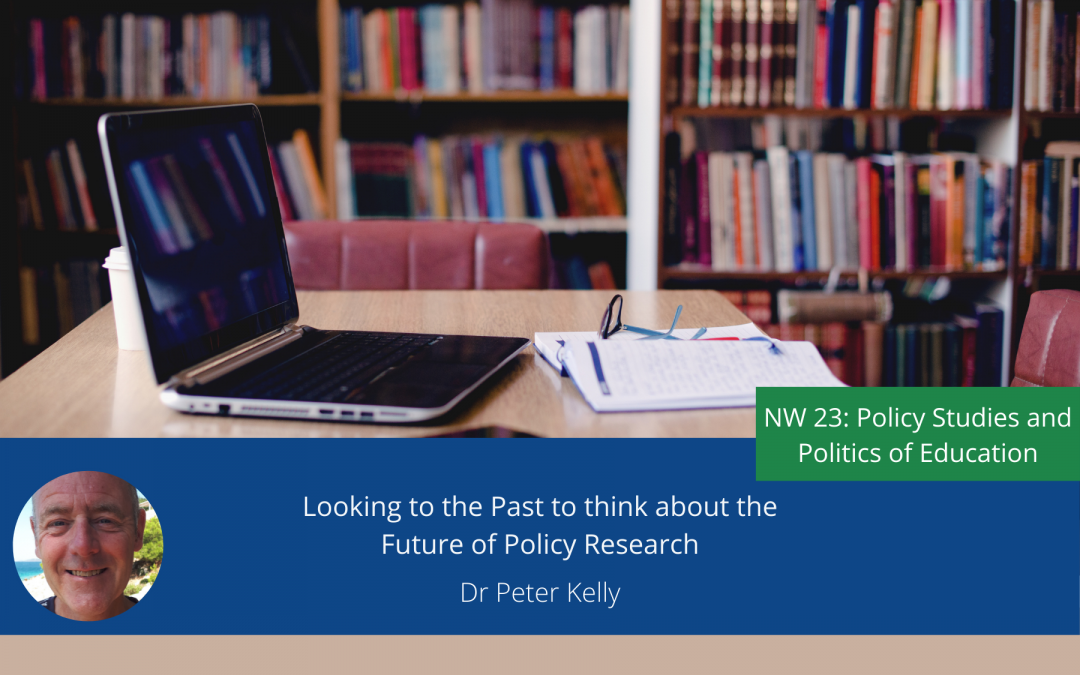
Looking to the Past to think about the Future of Policy Research
With the online European Conference on Educational Research 2021 fast approaching, to whet your appetite for what will doubtless be an exciting and stimulating event, you might like to revisit one of the academic highlights of spring 2021 for the Policy Studies and the Politics of Education Network (EERA Network 23). Our Online Seminar Series brought together leading academics in the field of education policy studies, all of whom have a close relationship with Network 23. Over 200 friends and associates of the network registered to attend the four seminars, reflecting the huge contribution made by each of our speakers to education policy research.
In one way or another, our speakers looked to the past to think about the future of critical education policy research.
Navigating Crisis: A reflection on 2020, entangled space-times of education, revisionist work and learning, and making histories
In the first seminar, Terri Seddon, Professor Emeritus of La Trobe University in Melbourne, reflected on the events of 2020 before looking to the future. In a powerful presentation, Terri brought together a variety of images and ideas with findings from a funded research project that investigated policy reform and policy effects in an ‘integrated partnership’ model of teacher education. Terri suggested that historical reading and writing can offer insights into educational knowledge building, and discussed processes of rereading the past and rewriting the future. Finally, in looking towards sustainable futures, Terri considered the place of doubt in partnership work and concluded with thoughts on the remaking of teacher education.
Multiple Temporalities in Critical Policy Sociology in Education
In the second seminar, Bob Lingard, Professorial Fellow in the Institute for Learning Sciences and Teacher Education at the Australian Catholic University and Emeritus Professor at The University of Queensland, discussed multiple temporalities in critical education policy sociology. Extending the concept of ‘historically informed’ in Jenny Ozga’s definition of education policy sociology in 1987, Bob considered different conceptions of the temporal which, he suggested, refers to the complex relationships between past, present, and future. Bob then argued that the temporal is neglected in critical education policy sociology, and demands new research and theoretical work. Looking back in time will help us understand the present and possible future in policy terms, and relationships between them.
Elites and Experts in Education Policy
In the third seminar, Jenny Ozga, Professor Emeritus of the University of Oxford and one of the founders of our network, discussed elites and experts in education policy. Jenny drew on work investigating the changing relationship between knowledge, expertise, and policy, looking at the forms of knowledge available to policy actors and the effects of these on the capacity of policy actors, including experts and elites, to govern education. Jenny compared the knowledge technologies and material processes available to policy elites and experts in the 1980s with those in contemporary contexts, to better understand knowledge-policy relationships. She concluded with some thoughts on how the pandemic has affected relationships between experts and policymakers.
Sedimentation and/or re-politicization of a highly marketized education system
In the final seminar, Lisbeth Lundahl and Linda Rönnberg, both Professors at the University of Umea, were joined by Professor Piia Seppänen of the University of Turku to discuss highly marketized education systems, focusing on Sweden. Their work builds on research carried out over several decades on the economisation of public education and its consequences, which include increased social segregation, reduced democratic influence over education, and the impoverishment of curricula. They set each of these in historical perspective within the Swedish context. Based on interviews with leading Swedish system actors, including education business leaders and various interest organisations, Lisbeth, Linda and Piia then reported on the extent to which commodification, privatization and marketization in education have become institutionalized, normalized, and therefore taken for granted. They identified this process as one that Bob Jessop describes as sedimentation, although they remained hopeful that re-politicisation of policy debates was now emerging.
This series provided an opportunity for those within the wider education policy research community to connect with each other. For many, these seminars provided some relief from the enforced isolation of the global pandemic, and were well received by all who attended. The speakers were generous in the time they gave, and provocative and insightful in their presentations. I am sure you will enjoy watching and listening to them, whether for the first time or as a reminder of what was a wonderful series.
Other blog posts on similar topics:

Dr Peter Kelly
Associate Professor (Reader) in Comparative Education · Plymouth Institute of Education
Peter Kelly is Link Convenor for Network 23: Policy Studies and Politics of Education. If you would like to know more about Network 23, he is happy to be contacted: peter.kelly@plymouth.ac.uk.
References and Further Reading
Alexiadou, Nafsika, Lundahl, Lisbeth & Rönnberg, Linda (2019). Shifting logics: education and privatization the Swedish way, in: J. Wilkinson, R. Niesche & S. Eacott (Eds) Challenges for public education: reconceptualising educational leadership, policy and social justice as resources for hope, London, Routledge. http://www.diva-portal.org/smash/record.jsf?pid=diva2%3A1267623&dswid=9840
Lingard, Bob (2021) Multiple temporalities in critical policy sociology in education, Critical Studies in Education 62(3) 338-353, DOI: 10.1080/17508487.2021.1895856. https://www.tandfonline.com/doi/abs/10.1080/17508487.2021.1895856
Manton, Claire, Heffernan, Troy, Kostogriz, Alex & Seddon, Terri (2021) Australian school–university partnerships: the (dis)integrated work of teacher educators, Asia Pacific Journal of Teacher Education, 49:3, 334-346, DOI: 10.1080/1359866X.2020.1780563. https://www.tandfonline.com/doi/abs/10.1080/1359866X.2020.1780563
Ozga, Jenny (2020) Elites and Expertise: the changing material production of knowledge for policy, in: G. Fan and T. Popkewitz (Eds) Values, Governance, Globalization, and Methodology, Volume 1, Singapore, Springer Open. https://www.springer.com/gp/book/9789811383465
